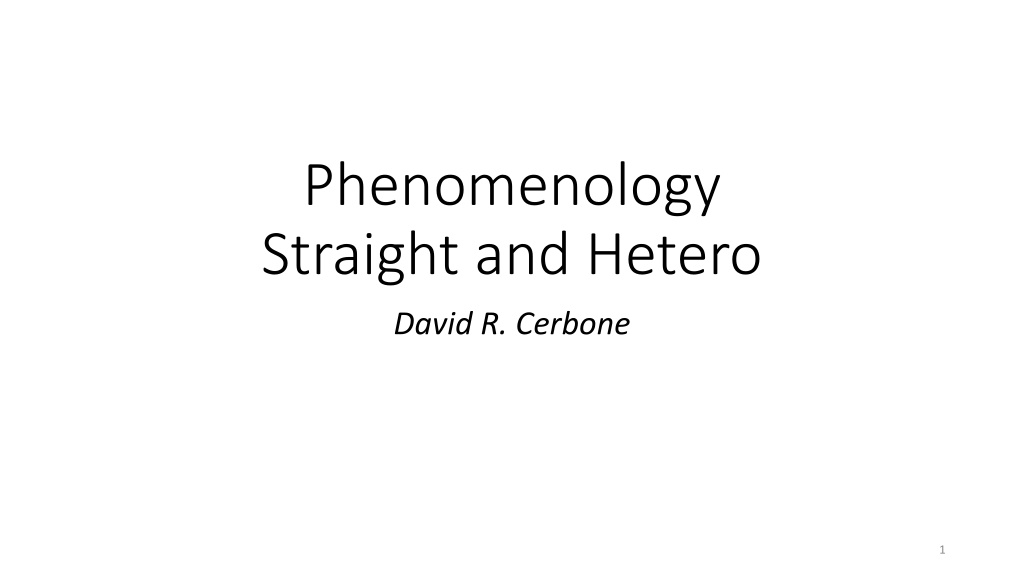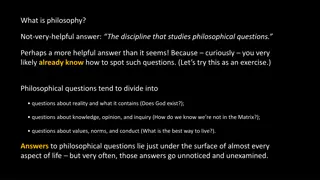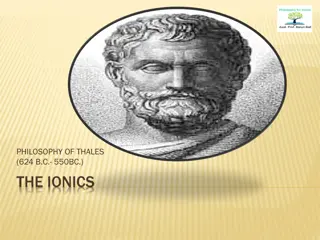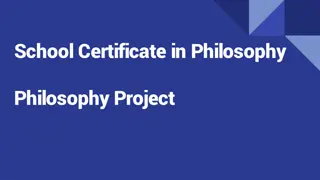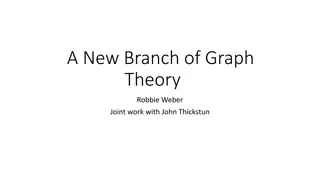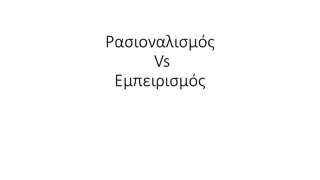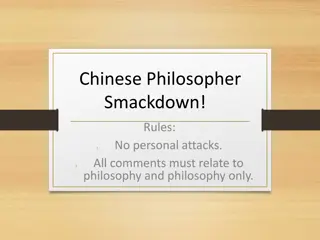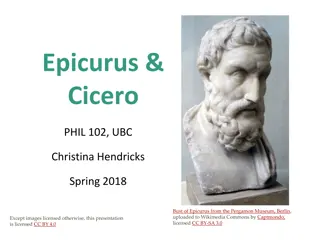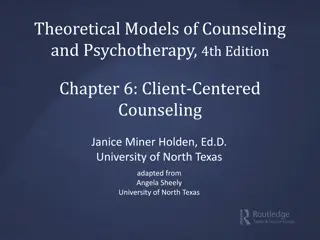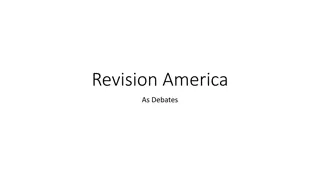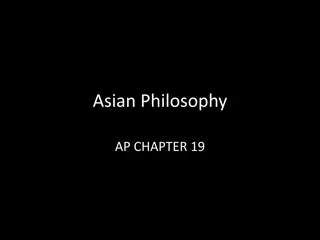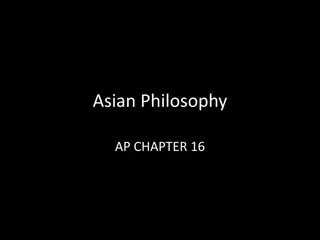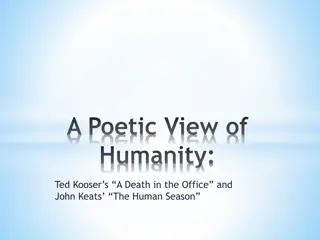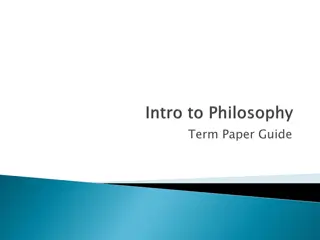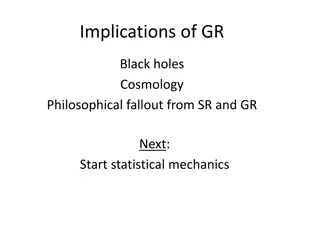Contrasting Philosophical Perspectives: Husserl vs. Dennett
Phenomenologist Husserl and philosopher Dennett hold contrasting positions on consciousness, naturalism, methodology, and science, with Husserl emphasizing foundational philosophy and Dennett favoring a scientific approach. The divergence in their perspectives is centered on consciousness, with each having unique aspirations and limitations. The exploration begins with Dennett's critique of Husserl, paving the way for a Husserlian response to Dennett's heterophenomenology.
Download Presentation

Please find below an Image/Link to download the presentation.
The content on the website is provided AS IS for your information and personal use only. It may not be sold, licensed, or shared on other websites without obtaining consent from the author. Download presentation by click this link. If you encounter any issues during the download, it is possible that the publisher has removed the file from their server.
E N D
Presentation Transcript
Phenomenology Straight and Hetero David R. Cerbone 1
Contrasting positions Edmund Husserl and Daniel Dennett differ in many ways 1 They are at opposite ends of the 20th century: Husserl at the beginning: Ideas Pertaining to a Pure Phenomenology (1913) Dennett at the end: Consciousness Explained (1992) 2 Naturalism and materialism The enemy for Husserl Our best hope for Dennett 3 Approach and aspirations Aprioristic and ideal for Husserl Tentative, empirical, and revisable for Dennett 2
Is philosophy a science? 4 Relation to others Husserl proceeds in solitude Dennett calls on researches across the disciplines 5. Re natural sciences Husserl sees philosophy as a rigorous science that is prior to and foundational for the natural sciences For Dennett philosophy follows the lead of the sciences 3
Centered on consciousness Trying to bring them together is like holding the like poles of a magnet together The closer you bring the poles the harder they push apart But measuring the force of repulsion is revealing Of divergent commitments Underlying assumptions Methodological limitations Ultimate aspirations All of which are centered on one point: consciousness And yet each will fail to see the other as actually describing what he considers this to be 4
Beginning with the later theory The approach here will not be to proceed in historical order laying out the positions of the earlier thought pointing to the features that will be challenged, changed, corrected, etc. by the later one and then asking how adequate was this later evaluation Progress or backsliding? insight or misinterpretation? But we begin with Dennett who has the advantage of being able to consider Husserl s position And of overcoming its shortcomings and pitfalls 5
A Husserlian response Here the focus will be on a Husserlian response to Dennett Husserl considered criticisms by philosophers who were similar to Dennett in his own time Like Dennett they were skeptical of the possibility of an introspective approach to the study of consciousness Such skepticism is a cornerstone of Dennett s heterophenomenology i.e. a third-person approach to the examination of consciousness hetero : other-based, as opposed to auto-phenomenology or self-based, first-person approach 6
What is at stake There will be no winner or loser in this though Cerbone is sympathetic to Husserl In measuring the failure of the attempt to bring them together we may better see what is at stake The viability of a transcendental philosophy in Husserl The inevitability of naturalism and materialism in Dennett 7
Which side do you prefer? The force of one s attraction to either side will be the measure of one s preference for Continental or Analytic philosophy The Continental tradition: Philosophy distinct from science The Analytic tradition While analytic philosophers don t all agree with Dennett they agree with him re the kind of project that is worth pursuing 8
The outside-in approach Heterophenomenology adheres to scientific method the challenge is to construct a theory of mental events, using the data that scientific method permits i.e., data available to a third-person, neutral investigator Hence: an outside-in strategy to the study of consciousness i.e., a perspective outside that of the agent whose consciousness is being studied 9
Bracketing the world Dennett s description of Phenomenology (capital P) Husserl tried to find a new foundation for all philosophy (indeed for all knowledge) based on a special technique of introspection in which the outer world and all its implications and presuppositions were supposed to be bracketed in a particular act of mind known as epoch . But this technique was never generally accepted Like other attempts to strip away interpretation and reveal the basic facts of consciousness to rigorous observation, such as the Impressionist movement in the arts and the Introspectionist psychologies of Wundt, Titchener, and others Phenomenology has failed to find a single, settled method that everyone could agree upon. 10
Experts on what swims in the stream of consciousness Hence, we should turn to the area in which there is a general agreement, natural science The expertise of scientists can be readily ranked But not that of Phenomenologists So while there are zoologists there really are no phenomenologists: uncontroversial experts on the nature of the things that swim in the stream of consciousness. Let s use phenomenology (lower-case p) for the various items in conscious experience that have to be explained 11
Desk-thumping cacophony But there is no consensus on what these items are no accepted inventory of what swims in the stream of consciousness Serious phenomenology is in even greater need of a clear, neutral method of description, because, it seems, no two people use the words the same way, and everybody s an expert. It is just astonishing to see how often academic discussions of phenomenological controversies degenerate into desk-thumping cacophony, with everybody talking past everybody else. This is all the more surprising, in a way, because according to long-standing philosophical tradition, we all agree on what we find when we look inside at our own phenomenology. 12
What we all agree on Despite the long-standing tradition about what is in consciousness the true picture is that of desk-thumping cacophony i.e., we fail to agree about what is in consciousness And so we must be fooling ourselves about something We all agree at least that we are conscious that there is something we can talk about 13
Different strokes 1 One possibility is that we are fooling ourselves about the extent to which we are basically alike The various schools of phenomenology agree on what their particular adherents see But go wrong in generalizing to all human beings Hence they don t recognize that different strokes for different folks applies also to phenomenology. Dennett doesn t spend any time on this position which supposes that different groups of people have radically different kinds of inner experiences 14
Is introspection reliable? 2) Another approach that gets closer to the truth: questions the reliability of introspection For centuries this capacity has been seen as immune from error Perhaps even if we are basically all alike in our phenomenology, some observes just get it all wrong when they try to describe it, but since they are so sure they are right, they are relatively invulnerable to correction. For Dennett this is not radical enough It supposes that there is a well-defined stream of consciousness which some are better at describing than others 15
Seeing or theorizing? 3) But we are fooling ourselves about the fact that we ever just look inside ourselves that the activity of introspection is evera matter of just looking and seeing. I suspect that when we claim to be just using our powers of inner observation, we are always actually engaging in a sort of impromptu theorizing and we are remarkably gullible theorizers precisely because there is so little to observe and so much to pontificate about without fear of contradiction. When we introspect, communally, we are really very much in the position of the legendary blind men examining different parts of the elephant 16
Basic points 1) there are fewer things swimming in this stream of consciousness than previously thought 2) what is taken to be there is the result, not of observation, but of spontaneous theorizing which may have the feel of observation but is as liable to error as in other areas and perhaps we are more liable to error when the area is one s own conscious experience 17
The time lag problem 1) Misremembering: the pitfalls of introspection from temporal lags If you are describing a past experience your memory may be faulty Your experience was one way But you mis-remember it as another way It could seem to you now that it seemed to you then to have been a horse even if in fact it seemed to you then to have been a cow The logical possibility of misremembering is opened up no matter how short the time interval between actual experience and subsequent recall. Such errors are highly recalcitrant to correction when limited to a first-person perspective 18
Error can creep in 2) The possibility of embedding: (1) I have a subjective experience (2) which provides grounds for my belief that I m having it (3) which spawns an associated thought (4) which incites in me a communicative intention to express it (5) resulting in an actual expression Isn t there lots of room here for error to creep into the transition from one to the other of these different states? If you can misspeak, can t you also misthink? 19
Standing on the bank of the stream Since there is so much room for speculation, fabrication, and misperception, introspection provides little solid basis for a scientific investigation of consciousness Hence instead of swimming along in consciousness while trying to grasp its nature heterophenomenologists stand on the banks outside of the stream 20
Dressed up parrots? Difference re bracketing (Husserl s epoch ) what one suspends believing in Husserl brackets the external world, and oneself as a denizen of that world Dennett brackets commitment to the reality of consciousness Officially, we have to keep an open mind about whether our apparent subjects are liars, zombies, parrots dressed up in people suits, but we don t have to risk upsetting them by advertising the fact. 21
What is given as data? So heterophenomenology does not study conscious phenomena because it is neutral with respect to whether there are any Its subject matter is reports of conscious phenomena transcripts in a lab from apparent subjects about their experience taking the noises they make as amounting to things they say involves too much of a leap beyond the given The transcript or text is not, strictly speaking, givenas data, for it is created by putting the raw data through a process of interpretation. 22
Intentional stance Dennett s intentional stance Raw data is invested with meaning taking on the shape of an utterance by and about an agent with beliefs, desires, and other psychological attitudes This does not mean that the apparent agent really is one It might be a dressed up parrot The intentional stance is maintained for its efficacy in explaining and predicting the subject s behavior The disguised parrot will probably give itself away eventually The adult human being will reward the neutral stance even if the observer is inclined to think that the subject is really conscious 23
Fiction and reality The heterophenomenologist proceeds by comparing these reports involving all the risks of going away from raw data with other data accessible (at least in principle) to the outside observer: What is going on in the subject s nervous system and brain Similar to our approach to fiction We compare what goes on in the novel with what we know about the author and his world 24
Subjects are fictions The reports are themselves treated as fictions relating to many different heterophenomenological worlds The phenomena are like those in fiction: They are cleverly disguised, reinterpreted versions of what s really going on in the brain The subjects are not real life denizens of the world in any straight-forward sense 25
[What is reading a novel?] Recall Carnap on poetry and science An expression of feeling Not truth about the world Now Dummett compares and the novel The reality of the novel? is found in what we know about the author and her world 26
[Reading a novel, watching a film] But is this an adequate account of the experience itself? Art (poetry, novels, films) involves a willing suspension of disbelief (Coleridge) We don t say/think, when we read: This is not real, but a fictitious account of a reality outside of it I.e., when we read a novel we treat the events as if they are real; we suspend our disbelief our awareness that it is fiction and enter into this other world 27
What they are really talking about? My suggestion, then, is that if we were to find real goings- on in people s brains that had enough of the defining properties of the items that populate their heterophenomenological worlds, we could reasonably propose that we had discovered what they were really talking about even if they initially resisted the identifications. 28
What it is like to be us We see now more deeply into Dennett s skepticism of phenomenology : If introspection is really a matter of theorizing and if the proper objects of theory are really objects and events in the brain it s no wonder people s reports are unreliable, In fact they are wildly inaccurate Very few of us have detailed knowledge of what is going on in our brains We are generally not positioned to see what s going on there What it is like to be us [recall Thomas Nagel] is at best an uncertain guide to what is going on in us. 29
Who is the authority regarding oneself? The indirect route of introspection is all we have to go on a very circuitous route like reading Victorian novels to understand the historical facts of the 19th century If you want us to believe everything you say about your phenomenology, you are asking not just to be taken seriously but to be granted papal infallibility, and that is asking too much. You are not authoritative about what is happening in you, but only about what seems to be happening in you, and we are giving you total, dictatorial authority over the account of how it seems to you, about what it is like to be you. 30
Multiple drafts theory of consciousness Dennett admits that his conception of consciousness is initially deeply counter-intuitive as it requires a radical re-thinking of the familiar idea of the stream of consciousness. Cerbone: Perhaps it is better to call this a scattered system of rivulets The multiple drafts model of consciousness at any point there are multiple drafts of narrative fragments at various stages of editing in various places of the brain. involving a constant process of additions, incorporations, emendations and overwritings of content [that] occur in various orders. 31
No finished draft But for a novelist, multiple drafts leads to a final perfected draft Not for the heterophenomenologist: Must important, the Multiple Drafts model avoids the tempting mistake of supposing that there must be a single narrative (the final or published draft, you might say) that is canonical that is the actual stream of consciousness of the subject. 32
Denying actuality is not a criticism The term actual supposedly applying to Husserl involves a confusion But for Husserl it is no criticism to say that the stream of consciousness is a matter of seemings Denying actuality is not for him a criticism It is like criticizing a mathematician s argument about a mathematical series for not describing a series in the actual world To attribute a nature to phenomena, to investigate the real component parts, their causal connections that is pure absurdity, no better than if one wanted to ask about the causal properties, connections, etc. of numbers (Husserl) 33
A science of seemings Phenomenology (with a capital P) is a science of seemings (phenomena) and any concern with actuality is beside the point Actuality is bracketed Thus if one is fond of paradoxical phrases, one can actually say, and if one means the ambiguous phrase in the right sense, one can say in strict truth, that feigning [Fiktion] makes up the vital element of phenomenology as of every other eidetic science [e.g., mathematics], that feigning is the source from which the cognition of eternal truths is fed. 34
Dennetts points 1) Phenomenology (capital P) is an introspective method for studying consciousness 2) but there is no agreed-on technique 3) This is because there is less there in terms of raw data than supposed 4) Introspection is impromptu theorizing not neutral observation 5) Such theorizing is unreliable because the true actuality is in the brain, to which outside expert observers have better access 35
Phenomenology (capital P) is not introspective Dennett s root mistake: to think that Phenomenology involves introspection The method depends on one s not confounding phenomenological intuition with introspection , with interior experience. (Husserl) Phenomenological intuition is a matter of reflection 36
The method of purification Different kinds of caution Dennett: skeptical re objectivity of introspection Husserl: The concern is with properly considering the phenomena that are to be investigated The method of epoch , of phenomenological reduction, is a method of purification of isolating the object to be investigated to avail ourselves of nothing but what we can make essentially evident by observing consciousness itself in its pure immanence. 37
Phenomenological reduction Purification requires bracketing the natural attitude our immersion in the natural, everyday world one s being amid things and events This is also a phenomenological reduction : shifting one s attention away from this natural attitude and toward the presentation of that world in the modalities of conscious experience 38
Cease positing the natural world we put out of action the general positing which belongs to the essence of the natural attitude; positing = implicit supposition of the reality/being of we parenthesize everything which that positing encompasses with respect to being: thus the whole natural world which is continually there for us, on hand, and which will always remain there according to consciousness as an actuality even if we choose to parenthesize it. 39
Another realm of being Such parenthesizing makes available another realm of being whose shape or sense is entirely independent of the truth or falsity of any and every thesis about the natural world thesis : some theory about the nature of this natural world no real being is necessary to the being of consciousness itself immanent being is therefore indubitably absolute being in the sense that by essential necessity immanental being nulla re indigent ad existendum [needs no thing to exist] [Recall Heidegger, who comes after Husserl: Husserl says that the being of immanent consciousness is no thing ] 40
Ontological independence of consciousness This ontological independence of consciousness from the realm of physical beings applies to the phenomenologist s own existence as a particular human being as it does to objects and events outside her body 41
Consciousness in its purity Thus it becomes clear that, in spite of all our assuredly well- founded statements about the real being of the human Ego and its conscious mental processes in the world and about everything in the way of psychophysical interconnection pertaining to them that, in spite of all that, consciousness considered in its purity must be held to be a self-contained complex of being, a complex of absolute being into which nothing can penetrate and out of which nothing can slip 42
A new consciousness within the old one This is not about a new series of conscious experiences, a non-empirical consciousness alongside an empirical one Rather, the pure consciousness is inside the ordinary one The pure mental process lies, in a certain sense, within what is psychologically apperceived, in the mental process as a human state. [Recall Sartre s example: 1) thinking about (imagining) Annie 2) seeing Annie herself 3) reflecting on the different structures of these two modes of consciousness 4) revealing the phenomenological essences or Ideas within the two modes] 43
Becoming attentive to consciousness itself What gets purified is the phenomenologist s own consciousness while living in the natural attitude Bracketing makes us attentive to consciousness in and of itself whose conceivability is independent of the goings-on of the natural world which could conceivably remain after the annihilation of the world. 44
Reflection and the phenomenological field This is not introspection but reflection: directing one s attention to the flow of one s conscious experience away from the objects and events with which that experience is typically concerned Instead of living in them, instead of effecting them, we effect acts of reflection directed to them; and we seize upon them themselves as the absolute being which they are. We are now living completely in such acts of the second degree, acts the datum of which is the infinite field of absolute mental processes the fundamental field of phenomenology. 45
First and second degree consciousness Reflection is second degree consciousness whose intentional objects are first-degree states of consciousness i.e., particular acts or episodes of perceiving, recollecting, fearing, imagining, perceiving, loving, etc. Conscious experience usually proceeds non-reflectively We are normally aware of what one is perceiving, remembering, fearing rather than the act of perceiving, remembering, fearing, etc. 46
[Sartre on Counting cigarettes] First order: How many cigarettes do I have? I count them: five, six, seven Second order: I recognize that I am normally focused on objects outside of me, not on myself as an ego who is doing the counting There is a kind of ego-less self-awareness, a pre-reflective self- consciousness in the counting of the objects My awareness of these features of experience is a matter of pure reflection (phenomenology) --Sartre, Being and Nothingness 47
[Pre-reflective self-consciousness and impure reflective consciousness of the ego] 1) I am counting cigarettes; there are twelve 2) I tell someone I have 12 cigarettes. She asks, Who counted them. I say, I did. Now I appears before my consciousness as the subject of my activity of counting the cigarettes 3) But in phenomenological reflection I recognize that there was no such explicit I there when I was counting in the first place because I was outside of myself in the counting. If there was a sense of self it was implicit, not explicit, a pre-reflective self-consciousness. But when I am asked about it, I recognize that I reflectively constitutean I, an ego, as the subject of my activity. But this is not the result of pure phenomenological reflection. Sartre calls it the result of impure reflection 48
[Three stages of experience] My awareness of my self as an explicit Ego is the result of impure reflection, something I actively posit (make up) in answer to the question, who counted the cigarettes? I suppose that my Ego did the counting: Idid it. And thereby distort the relative egolessness of the prereflective experience of counting the cigarettes I invent (or posit ) this ego when I think about my previous activity In pure phenomenological reflection I recognize that The pre-reflective self-consciousness in the first place, when I was counting, is phenomenologically distinct from the impure reflective self-consciousness that I later posit in answer to the question Dennett takes the difference between the immediate stream (1) and the invented interpretation of it (2) as an argument against Phenomenology (3) 49
[Heidegger: ready-to-hand and present-at- hand] Heidegger examines the context of our assertions 1) This hammer is too heavy. In the context of ready-to-hand employment Hammering for the purpose of (making money as a roofer, saving my house ) background context of the world, and myself as a being-in-the-world But the hammer is heavier than I am used to, and so I stop and think about it, for its own sake I am then surrounded by a collection of things: hammers, nails, tiles, houses the world reduces to a collection of entities, beings And I now emerge as this separate subject, taking inventory of the things 2) This hammer is made of steal. In the theoretical context, of present-at-hand beings 50
